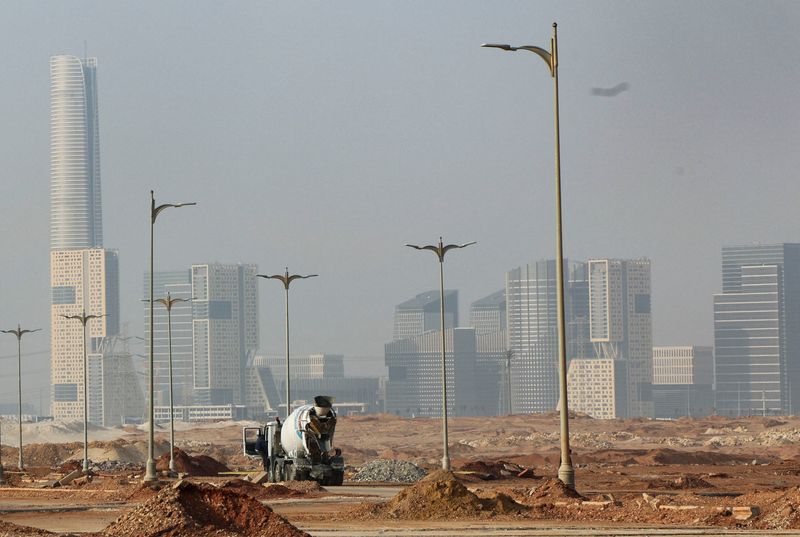By Patrick Werr
CAIRO (Reuters) - A steady deterioration of the economy puts Egypt under pressure to take long-awaited measures following a presidential election, foremost among them a currency devaluation and a hike in interest rates, along with faster state asset sales.
Analysts believe the government postponed painful steps until after Abdel Fattah al-Sisi swept to a third six-year term in a Dec. 10-12 vote that saw no serious challengers and was overshadowed by the war in Gaza.
The focus now turns to how to deal with an overvalued currency, near-record inflation and massive debt, both domestic and foreign.
"There are a lot of big choices for the government to make, but a credible currency is key for a meaningful economic recovery," said Simon Williams of HSBC.
A dollar that fetched 29 Egyptian pounds on the black market a year ago now buys more than 50 pounds, compared to an official rate of 30.85 pounds.
Foreign exchange forward prices that predict where the pound will be in late January put it at 35 to the dollar while those that look a year ahead have it at nearly 50.
Exchange rate uncertainty has led Egyptians abroad to withhold sending earnings home, wreaking havoc to a top source of foreign exchange. Remittances plunged by nearly $10 billion over a year to $22 billion in the 12 months to end-June 2023.
"Remittances are about sentiment, not the level. Egyptians have to be persuaded that the currency is now stable. They have to have confidence in its value. If that happens remittances can turn around relatively quickly," Williams said.
Authorities have implemented three sharp devaluations of the currency since early 2022, but each time have reverted to fixing the rate despite pledges to the International Monetary Fund to shift to a permanently flexible system.
"We think a step adjustment is more likely in the short term, rather than a transition to a floating arrangement," Morgan Stanley Research said in a note.
DEBT BURDEN
A $3 billion financial package reached with the IMF a year ago faltered after Egypt failed to let its currency float freely or make progress on the sale of state assets. The IMF has delayed disbursements of about $700 million due in 2023.
Yet the IMF this month said it was in talks to expand the package due to economic risk from the Israel-Hamas conflict, and has appeared to shift its emphasis from the exchange rate to inflation targeting.
"Our focus is to have the economy function as well as possible. In that sense, yes, we prioritise fighting inflation and then of course we would look at the exchange rate in that context," IMF Managing Director Kristalina Georgieva told Sky News on Dec. 3.
IMF spokesperson Julie Kozack later said Egypt's programme included the need to tighten monetary and fiscal policy, together with a flexible exchange rate system, "to gradually move to an inflation targeting regime".
The impact of the Gaza crisis on tourism and attacks on Red Sea ships, deterring some from navigating through the Suez Canal, have created new threats to currency flows. Egypt in 2022/23 earned $13.6 billion from tourism and $8.8 billion from Suez Canal fees, according to central bank data.
Egypt needs the currency to repay its medium- and long-term public foreign debt, which jumped by $8.4 billion in the six months to July 1 to $189.7 billion. At least $42.26 billion of foreign debt repayments are due in 2024.
In January, the IMF estimated Egypt's financing gap over 46 months at $17 billion.
ASSET SALES
Egypt also needs to clear a backlog of goods at ports, pay arrears to foreign oil companies and let companies send funds owed to their overseas offices -- as well as meet pent-up demand for imports.
It has traditionally leant on its wealthy Gulf allies for support, but none has made any announcements of major aid in recent months.
The government has instead turned to multilateral finance organisations and a widening range of friendly states, raising funds this year from Japan, China, India and the UAE.

It is also counting on raising cash from state asset sales, where progress in recent years has often stalled but some analysts now see a shift.
"Egypt has made considerable progress in sales of state-owned assets, attracted historically high levels of net FDI inflows, and has met its fiscal targets in (2022-23) despite higher government spending due to the surge in inflation and borrowing costs," Morgan Stanley wrote.